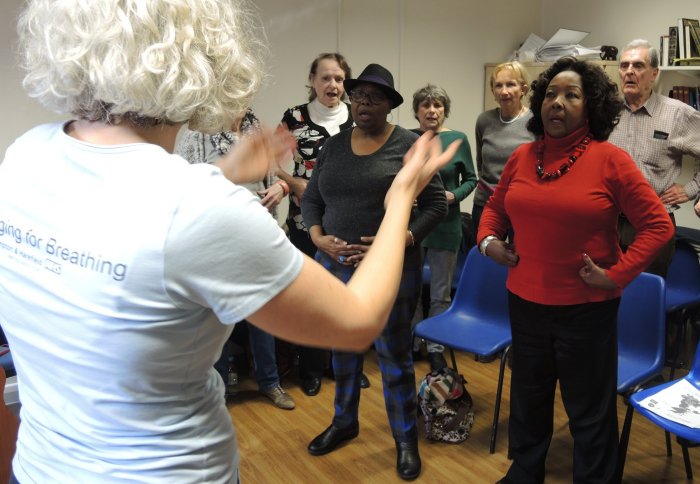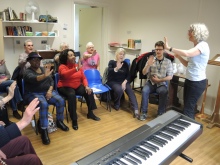Is singing good for your respiratory health?

Researchers are trying to understand the secret to the success of singing groups set up to benefit patients with respiratory conditions like COPD.
Singing for Breathing based at the Royal Brompton Hospital (RBHT) aims to enhance existing physiotherapeutic support for respiratory conditions by introducing patients to a new form of enjoyable, informal exercise, teaching a better understanding of breath control through the use of the voice. The National Heart and Lung Institute is pleased to support their work through our researchers Dr Adam Lewis and Dr Nicholas Hopkinson who have been looking at the science behind the project.
Singing for Breathing began at the Royal Brompton hospital in September 2008 and was the first hospital based programme of its kind in the UK. The concept was inspired by Bronchial Boogie, a project for upper primary aged children in Oldham. This provided asthma education, breathing exercises and wind instrument tuition to improve respiratory health and self-esteem.
Dr Adam Lewis, a respiratory specialist physiotherapist, is currently undertaking a service evaluation into the British Lung Foundation (BLF) funded Singing for Lung Health (SLH) training. Dr Hopkinson will provide guidance and expert opinion on the overall evaluation findings. We asked Adam to explain more about his study:
What is the study looking at?
The service evaluation is exploring to what extent the training delivered by the BLF is being used effectively in the associated singing groups around the country. The evaluation will also explore how Singing for Lung Health can be distinct from singing for wellbeing and whether it is plausible for the NHS to adopt Singing for Lung Health as a potential intervention available for people living with breathing problems.
Why are you doing this research? How will it benefit patients?
 This service evaluation is needed because there has been an explosion of singing groups around the UK which are being catered for people who have respiratory conditions. However, you don’t need any qualification to be a singing leader. To what extent these non-BLF associated groups are appropriate or effective as a whole is unclear. As part of the evaluation we are visiting groups that have not been led by BLF trained leaders in order to learn what other groups include, and whether the BLF training would be valuable to a larger number of practitioners around the country. Moreover, once the nature, content and structure of SLH can be agreed upon with some evidence that it provides benefit, future larger scale respiratory clinical trials could be designed to build on a small evidence base that singing may be an effective therapy for improving patients’ quality of life and lung function.
This service evaluation is needed because there has been an explosion of singing groups around the UK which are being catered for people who have respiratory conditions. However, you don’t need any qualification to be a singing leader. To what extent these non-BLF associated groups are appropriate or effective as a whole is unclear. As part of the evaluation we are visiting groups that have not been led by BLF trained leaders in order to learn what other groups include, and whether the BLF training would be valuable to a larger number of practitioners around the country. Moreover, once the nature, content and structure of SLH can be agreed upon with some evidence that it provides benefit, future larger scale respiratory clinical trials could be designed to build on a small evidence base that singing may be an effective therapy for improving patients’ quality of life and lung function.
There has been a lot of qualitative work with patients in the past which has been overwhelmingly positive regarding the benefits of SLH, this evaluation will build on this knowledge.
How are you conducting the research?
I have travelled England with Singing for Breathing facilitator, Phoene Cave, observing 15 SLH groups and 2 non-BLF supported groups. I have also conducted interviews with all of the group leaders about their experiences of the training and running groups, and questionnaires are being given to singing leaders before and after they have received the training. This will enable future recommendations to be made to the BLF on ways in which the training programme needs improving and what aspects of the training work well.
Questionnaires have also been given to new members of a SLH group to ascertain to what extent SLH is impacting on the health of those who have respiratory conditions.
What is your ultimate goal with the study?
The ultimate goal of this service evaluation is to ensure that the training given to singing leaders and subsequent SLH groups that are run, are as robustly developed as possible, evidence-based and delivered in a way that will benefit people living with respiratory conditions. This training and the format of SLH groups could then be rolled out for many more people with COPD who require a wider choice of self-management interventions that are both fun and have the potential to improve their health.
Dr Nick Hopkinson has already led two clinical research trials with the most recent being published in 2012 in BioMed Central (‘Singing classes for chronic obstructive pulmonary disease: a randomized controlled trial’). A national consensus statement about singing for lung health will be published in the next few weeks.
Singing for Breathing began under the auspices of the arts charity Royal Brompton and Harefield Arts (rb&hArts). The BLF approached Phoene Cave in 2013 when she set up a similar group at the Whittington hospital and asked her to write and deliver a training programme. Singing for Breathing, based at the largest respiratory unit in Europe, continues to be funded entirely by charitable donation. The project has developed and blossomed, with the model being adopted in other hospital and community settings across the country. To date the BLF have trained 30 singing leaders and there are 27 groups still running across the UK.
Photo credit: Royal Brompton
Article supporters
Article text (excluding photos or graphics) © Imperial College London.
Photos and graphics subject to third party copyright used with permission or © Imperial College London.
Reporter
Ms Helen Johnson
Communications Division